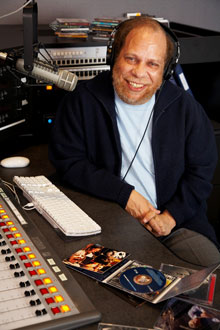
Music radio - specifically jazz - in Boston
just took another big hit. Beginning on July 2, WGBH will begin to make changes
that will drastically reduce the hours of both its locally-produced and
nationally syndicated jazz shows. Specifically, Eric Jackson's evening jazz
show - currently heard Monday through Thursday from 8 pm to midnight, and
Sundays from 10 to midnight - is moving to weekends only, 9 pm to midnight.
Local host Steve Schwartz, who had been playing jazz on Friday nights, will no
longer be on air. What's more, nationally syndicated, San Francisco-based jazz
host Bob Parlocha, now heard in the overnight hours seven nights a week, will
be broadcast on weekends only. The weeknight hours will be given over to news
and public affairs.
For jazz fans, the hit that really hurts is the crimping of Jackson, who has
been broadcasting at WGBH since 1981 and is a fixture of the local scene. Not
only does Jackson
have impeccable taste in all styles of acoustic and electric jazz, but his
smooth, genial delivery and knowledgeable commentary have been a boon. Over the
years, by his count, he's done 3000 interviews with local and national
musicians as well as hosting live performances in the studios. Similarly,
Schwartz is a longtime presence on the Boston
scene with a deep wealth of personal knowledge.
In a phone interview Wednesday afternoon, Jackson emphasized the importance of locally-based
jazz programming that's "in the moment," and connected locally, can comment on
coming concerts or other events in the jazz world. "If, heaven forbid, Sonny
Rollins died, [the pre-recorded syndicated host] is not going to do anything
about it. He's not going to mention it, let alone give you a Sonny Rollins
special. Or if a major figure in the Boston
jazz scene passed away, you're not likely to hear that either."
There is jazz being played locally various college and independent stations,
but as Jackson pointed out, none of them
has the presence - either in signal strength, local connections, or number of
programming hours - to be "the jazz
station" in Boston. Which, even with the gradual erosion of hours over the
years, WGBH has become.
Jackson
posted the news on his Facebook page Wednesday afternoon, and the reaction from
fans online was immediate. In an email, jazz publicist Sue Auclair pointed out,
"These programs are extremely important to proliferation of the music, the
artists, the jazz clubs, and the jazz festivals in the region and all related
businesses, sponsorships, etc." A Facebook group has already been formed, "Save
Eric in the Evening Group."
However, it's unlikely that such a group will change any decisions at WGBH.
Some years ago, a similar effort was made to save Ron Della Chiesa's Music America program, to no avail.
What's more, the erosion of music in favor of news and public affairs at public
radio stations has been a steady trend over the years, nationally and locally.
WBUR, which used to have robust classical and jazz programming, is now entirely
news and public affairs. And WGBH has ceded more and more music programming,
discontinuing both its blues and folks shows as well as cutting jazz hours.
A phone interview
with WGBH managing director Phil Redo confirmed that news and public affairs
has over the years gained in support from listeners. He said that jazz is an
"important part of GBH's DNA," and that concentrating jazz on the weekends
rather than gradually chipping away at its weeknight hours would give the
station a chance to make it "appointment listening." But he conceded that "for
the person who listens only on a Tuesday night, this is an awful decision. I've
had that happen to me as a listener, and I don't like it." He reiterated the
station's commitment to jazz and its cultural reporting. But, he added, "The
danger is to spin this by saying that it's better this way. If you're a jazz
fan, it's not better."



















